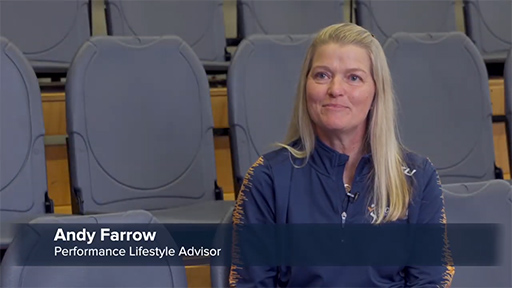2 Performance lifestyle
In recognition of the challenges that career transitions in sport can bring about, it is now commonplace for elite level athletes to have access to ‘athlete lifestyle’ or ‘performance lifestyle’ programmes to help them to prepare for the transitions they will face. The athletes in Activity 1 both referred to the performance lifestyle support they received from the English Institute of Sport (EIS) and cited this as helping them to develop their life outside their sports.
Performance lifestyle can be defined as ‘tailored, individualised coaching, mentoring and counselling services that support performance athletes, coaches and key personnel in all aspects of an athlete’s life – ensuring they successfully manage the transitions, challenges and choices encountered within the performance environment and in life away from sport’ (Sport Scotland, 2018). The video below explores the role of a performance lifestyle advisor.

Transcript: Video 3
[MUSIC PLAYING]
In the next activity you will reflect on the benefits of performance lifestyle programmes for athletes.
Activity _unit4.3.1 Activity 2 Preparing for life after sport
Watch Video 4 which explores some research undertaken by David Lavallee (2019) on performance lifestyle. As you watch the video make a list of the benefits for athletes engaging in performance lifestyle programmes, and then think about how you could apply principles of these programmes to your own situation (as an athlete, coach or parent).
Transcript: Video 4
[MUSIC PLAYING]
[MUSIC PLAYING]
Discussion
Performance lifestyle programmes are believed to be effective in helping athletes to prepare for career transitions. For example, in his study of rugby league players which is discussed in Video 4, Lavallee found that players who engaged with pre-retirement planning support services were not only better prepared for career transitions, but also derived performance advantages such as being more likely to be selected for teams or having longer careers. It was suggested that performance gains might be due to the players having fewer concerns about the future, resulting in greater levels of satisfaction and enhanced capacity to focus on their sports performance. In the video, Lavallee suggests that this holistic approach to developing athletes − which focuses on athlete welfare and wellbeing − is superior to a ‘win at all costs’ approach as it still leads to winning and successful performance.
It is important to note that while only high level athletes tend to have access to performance lifestyle programmes, that doesn’t mean that lower level athletes should miss out. Transitions are still highly significant for these athletes too and similar support should be offered by significant others around these athletes, such as coaches, parents or teammates.
If you are one of these significant others you can incorporate principles from the programmes in the videos into your own practice by speaking to your athletes about the importance of preparing for transitions in their sporting careers and developing their identity outside sport. You may, for example, encourage an athlete to look at local college or university courses or encourage them to socialise with friends when not training or get a part-time job. Telling athletes that developing their identity outside sport can actually improve their performance − as shown in Lavallee’s (2019) research − could well be a good motivation!
These programmes are all about preparing athletes for transition and developing plans to cope. In the next section you will investigate in more detail what developing a career transition plan might involve.
